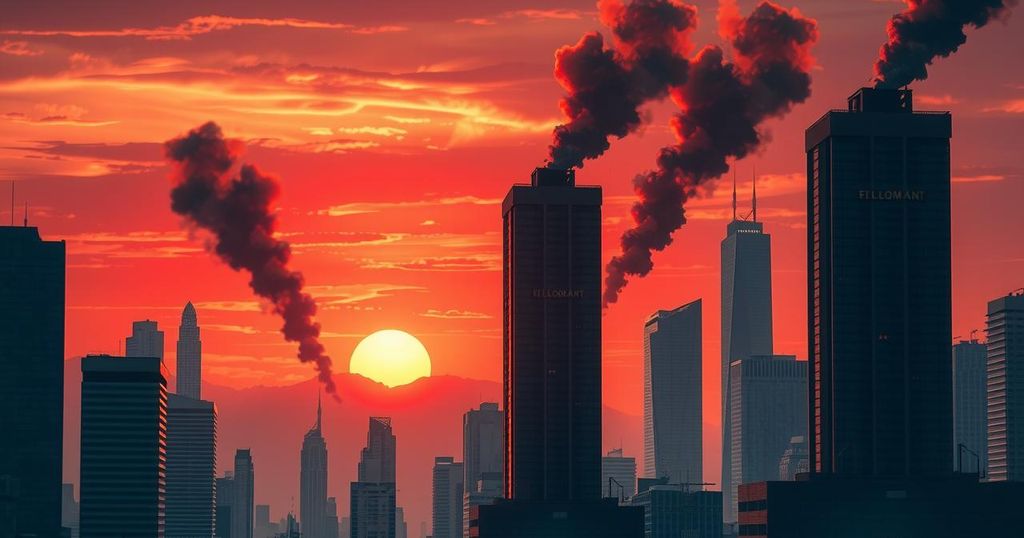Global news
AP, ASIA, BENJAMIN NETANYAHU, CONFLICT, DRONE STRIKE, HEZBOLLAH, HO, HOSSEIN SALAMI, INTERNATIONAL ATOMIC ENERGY AGENCY, IRAN, MARCO RUBIO, MIDDLE EAST, MIDDLE EAST AFFAIRS, MILITARY OPERATIONS, PALESTINIAN TERRITORIES, RETALIATION, REVOLUTIONARY GUARD, TEHRAN, U. S, VA, VAHID SALEMI
Marcus Li
0 Comments
Israel Launches Attack on Tehran, Escalating Tensions in the Middle East
Israeli forces launched a surprise attack on Tehran early Friday, targeting nuclear and military sites amid heightening tensions over Iran’s nuclear program. General Hossein Salami of the Revolutionary Guard is feared dead along with other officials. Prime Minister Netanyahu stated the operations would continue as necessary to neutralize threats. U.S. Secretary of State Rubio recognized Israel’s action as self-defense while emphasizing the importance of protecting American interests. The incident has sparked increased oil prices and regional unease.
In a dramatic escalation of tensions in the Middle East, Israeli forces launched a surprise attack on Iran’s capital, Tehran, early Friday morning. Explosions reverberated across the city, with reports of significant damage to various sites thought to be connected to Iran’s nuclear and military capabilities. This comes amid ongoing debates regarding Iran’s nuclear ambitions, which have raised alarms internationally.
According to Iranian state media, General Hossein Salami, head of Iran’s paramilitary Revolutionary Guard, is feared dead, along with reports of other high-ranking officials and nuclear scientists among the casualties. The state television broadcast also indicated that the headquarters of the Revolutionary Guard was set ablaze during the strikes, heightening concerns about Iran’s military capabilities.
Sources indicate that Israeli Prime Minister Benjamin Netanyahu justified the attacks as a necessary step to curb Iran’s advancing nuclear program. Following these actions, Netanyahu stated in a recorded message that Israel would persist in its operations to eliminate threats from Iran for as long as needed. This defensive posture illustrates the tense dynamics surrounding Iran’s potential to develop nuclear weapons, a concern that has long preoccupied Israeli leadership.
Compounding the volatility of the situation, U.S. Secretary of State Marco Rubio commented that Israel undertook these “unilateral actions” based on what it deemed crucial for its self-defense. Rubio emphasized that while the U.S. is not participating in the strikes, protecting American personnel and interests remains a top priority.
In Tehran, residents awoke to the sounds of explosions and rising smoke, particularly noted in the Chitgar neighborhood. While initial reports did not confirm the specific targets, an anonymous Israeli military official stated that the operation primarily aimed at Iran’s nuclear sites, aligning with Israel’s longstanding concerns regarding Iranian military advancements.
The ramifications of the attack have reverberated through global markets, with oil prices spiking nearly 5% amid fears of regional instability. Defense Minister Israel Katz confirmed Israel’s involvement, warning that retaliation from Iran, including missile and drone strikes, could be imminent. Furthermore, Katz has urged citizens to heed instructions and stay alert as the situation evolves.
Both nations have reportedly closed their airspace as tensions escalate. In a notable moment, U.S. President Donald Trump was seen mingling with Congress members on the White House lawn amid the unfolding crisis, unaware of the latest developments. Earlier in the week, Trump expressed his desire for Netanyahu to exercise restraint and suggested that military action could jeopardize negotiations with Iran on its nuclear program.
As the situation continues to develop, observers are closely monitoring the fallout, including potential impacts on broader U.S.-Middle East relations.
This recent attack underscores the precarious state of affairs between Israel and Iran, as escalating military actions may prompt a cycle of retaliation. Netanyahu’s resolve highlights Israel’s commitment to prevent any potential threats from Iran’s nuclear ambitions. Meanwhile, international observers, including U.S. officials, are watching closely, gauging how this conflict might impact stability in the region and relations involving the U.S. It is a critical moment that may shape future interactions between these nations.
Original Source: apnews.com




Post Comment